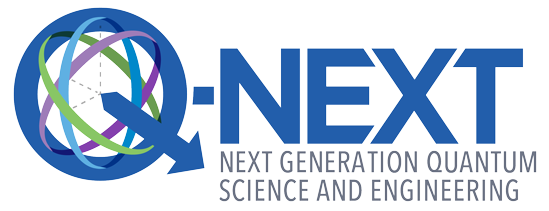award
-
Danna Freedman receives 2022 MacArthur Fellowship
From MIT News: Danna Freedman, the F.G. Keyes Professor of Chemistry at MIT and a Q-NEXT member, has been named a recipient of a 2022 MacArthur Fellowship. Freedman designs novel molecules that could be used for quantum sensing and communication. Read More
-
Quantum physics titans win Breakthrough Prize
From Scientific American: This year’s Breakthrough Prize in Fundamental Physics honors four pioneers who combined math, computer science and physics to do “foundational work in the field of quantum information.” The prize is shared between Charles Bennett of IBM, Gilles Brassard of the University of Montreal, David Deutsch of the University of Oxford and Peter Shor of the Massachusetts Institute of Technology. Read More
-
Prestigious New Horizons in Physics Prize awarded to UChicago Pritzker School of Molecular Engineering faculty Hannes Bernien
From the University of Chicago: Given to promising early-career researchers who have produced significant work, Q-NEXT collaborator Bernien and his colleagues are being recognized for developing optical tweezer arrays able to control individual atoms for use in quantum information science, metrology, and molecular physics. Read More
-
Chemist Randall Goldsmith named a Schmidt Science Polymath
Q-NEXT collaborator Randall Goldsmith exploits quantum processes to focus on single molecules. His approach to studying chemical and biophysical systems caught the attention of Schmidt Futures, which named Goldsmith one of its 2022 Schmidt Science Polymaths award winners. Each of the 10 recipients, who are newly tenured university faculty chosen for their promising interdisciplinary research, receives $2.5 million over five years to help fund their research groups. Read More
-
Liang Jiang named finalist for 2022 Blavatnik National Awards for Young Scientists
From the University of Chicago: Jiang investigates quantum control and quantum error correction to protect quantum information from decoherence. Potential applications for his work include quantum sensing, quantum transduction, quantum communication, and quantum computation. Read More
-
Danna Freedman named 2022 Blavatnik Award finalist
From MIT Chemistry: Freedman has elevated molecular qubits to the cutting edge of quantum information science by achieving record stability and demonstrating optical read-out of a molecular qubit state. Thanks to her momentous discoveries, molecular qubits will certainly be a major player in future quantum information technology. Read More
-
Recognizing America’s leading innovative scientists, the 2022 Blavatnik National Awards for Young Scientists names 31 finalists
Q-NEXT collaborators Danna Freedman of MIT and Liang Jiang of the University of Chicago are named two of 31 finalists for the 2022 Blavatnik National Awards for Young Scientists, the world’s largest unrestricted prize honoring early-career scientists and engineers. Read More
-
University of Wisconsin–Madison's Mikhail Kats, Mark Saffman honored
From the University of Wisconsin–Madison: Q-NEXT collaborators Mikhail Kats and Mark Saffman of the University of Wisconsin–Madison have received fellowships from the university's Office of the Vice Chancellor for Research and Graduate Education for 2022-23. Kats received a Romnes Fellowship, which recognizes faculty with exceptional research contributions within their first six years from promotion to a tenured position. Saffman received a WARF professorship, which honors faculty who have made major contributions to the advancement of knowledge, primarily through their research endeavors, but also as a result of their teaching and service activities. Read More
-

Shimon Kolkowitz of Q-NEXT quantum center awarded Sloan Fellowship
The competitive, prestigious award is given to promising researchers in the early stages of their careers. Read More
-

Laura Gagliardi elected to Italian National Academy of Sciences
The academy is one the world’s oldest and most prestigious scientific academies, counting Louis Pasteur, Albert Einstein and Enrico Fermi among its members. Read More
In the News
See all In the News-
The best qubits for quantum computing might just be atoms
From Quanta: Mark Saffman of the University of Wisconsin–Madison and Infleqtion is featured in this comprehensive overview of neutral-atom qubit research. Read More
-
How quantum computing could help us understand the universe
From PBS NewsHour: David Awschalom appears in this piece on the next generation of computing, one that will be far more sophisticated and dependent on understanding the subatomic nature of the universe. Read More
-
PME-led research into protein-based qubits earns $2.75M Moore Foundation grant
Bolstered by a new $2.75 million grant from the Gordon & Betty Moore Foundation, a team led by University of Chicago's Peter Maurer will soon study qubits made from protein. Read More
-
Infleqtion unveils 5-year quantum computing roadmap, advancing plans to commercialize quantum at scale
From Quantum Insider: Infleqtion shares a broad business update, including the first look at its new 5-year quantum computing roadmap. The roadmap's centerpiece is Sqorpius, the next phase of Infleqtion’s quantum computing program. Read More
-
Bringing quantum entanglement to the people
From the National Science Foundation: NSF’S Quantum Leap Challenge Institute Hybrid Quantum Architectures and Networks at the University of Illinois Urbana-Champaign, a Q-NEXT partner, has created a working demonstration that brings entanglement between photons to a public setting for the first time. Read More
